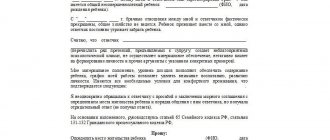Theoretically, representatives of guardianship can come and check on any family in respect of which a signal has been received from a doctor, from an educational institution or from neighbors, in order to make sure that everything is fine with the child. To avoid most of these “signals”, you should not neglect to comply with legal procedures.
Let the state know that everything is fine with you and your child by following simple rules:
- do not leave the maternity hospital without an extract (you can always get an extract “on receipt”);
- do not delay visiting the children's clinic and obtaining a birth certificate;
- If you are pregnant, contact an antenatal clinic. If a pregnant woman was not observed, gave birth at home, and then is in no hurry to register the child, this may mean either that she adheres to the theory of natural parenthood, or that the woman missed the deadline for an abortion and wants to get rid of the child after its birth;
- write a refusal to vaccinate - a “silent” refusal may indicate not a conscious position, but banal sloppiness;
- if you use the services of a paid pediatrician, inform the head of the children's clinic;
- If your son is involved in a boxing class and bruises appear on his body after classes, report this to the school.
If the guardianship authorities nevertheless come to you, follow the instructions of the pravmir.ru portal.
Guardianship came to me. Do I have to let them into the house?
Whether or not to allow security guards into the apartment is at your discretion. In accordance with Article 25 of the Constitution of the Russian Federation, housing is inviolable. Against the will of the persons living in the premises, access there is carried out either by a court decision or in cases established by law.
The only statutory case applicable to such situations is the right of police officers (but not guardians) to enter, in accordance with paragraph 3 of Art. 15 of the Police Law, into residential premises if there is sufficient evidence that a crime has been committed or is being committed there (for example, a child screams loudly and hysterically, asks for help). In any case, parents have the right to find out from the police exactly what grounds they have for such assumptions.
If you do not want to let the guardianship authorities in for any reason (guardianship came at an inconvenient time for you, when the child is sleeping; you refused to visit the apartment because those who came refused to take off their shoes), record the reason in writing. For example: “After 22:00 my child sleeps, and I see no reason to violate the established routine of his day. I ask you not to allow the commission’s visits at night in the future” or “I ask the guardianship staff to have spare shoes with them in case of a visit to my apartment for an inspection.” Make a copy of this statement and take it to the guardian. Be sure to make sure that there is a mark of acceptance on it. If they suddenly refuse to accept such an application, it can be sent by mail by registered mail with acknowledgment of receipt with a list of the contents.
Legislation
In 2021, Russian family law still differs significantly from European legislation in the field of juvenile justice.
The main provisions that determine the grounds and procedure for removing a child from the family:
- Art. 69— RF IC – reasons and procedure for deprivation of parental rights;
- Art. 71- RF IC - legal consequences of deprivation of parental rights for parents and children, opportunities for restoration of parental rights;
- Art. 73-76 RF IC - reasons, procedure and consequences of restriction of parental rights;
- Art. 77 of the RF IC - reasons and procedure for removing a child from the family;
- Chapter 18 of the RF IC – detection of children left without parental care, registration and placement of children in specialized institutions.
and…
- Federal Law of the Russian Federation No. 124 “On guarantees of the rights of the child in the Russian Federation” dated July 24, 1998 - a list of rights vested in minor citizens of the Russian Federation and methods of their protection;
- Federal Law of the Russian Federation No. 159 “On additional guarantees of social support for orphans and children left without parental care” dated December 21, 1996 - measures and methods of state support for children left without parental care, including due to deprivation or restriction of parental rights .
How do guardianship authorities operate?
As a rule, immediate removal of a child does not occur. If a representative of the guardianship authorities tries to take the child “just like that,” then the parent should know: he does not have the right to commit such actions. And guardianship is required to perform several actions:
- conduct a conversation with the parent (legal representative);
- check the facts specified in the application on the basis of which they want to remove the child from the family.
Lawyers advise immediately contacting a lawyer as soon as a representative of the guardianship authorities appears on the horizon. The fact is that there are quite a lot of regulations and laws regulating the selection process. And a parent in a stressful situation may simply not understand the law and miss the opportunity to immediately put an end to the matter: it is easier not to give up the child than to return it later. A lawyer will be able to check the actions of employees for compliance with the law and defend the rights of parents and children on the spot.
Guardianship representatives visited the Sokolov family and tried to remove the child. While the mother was panicking, the father contacted a lawyer and asked for help. The lawyer advised to check whether the officials have an act of forced seizure or a court decision. Indeed, in the absence of these documents, the removal of the child will be unlawful. The head of the family demanded confirmation of authority from the guardianship representatives, but they did not have any “permit” documents. Guardianship did not take the children. Later, in the presence of a lawyer, the guardianship authorities established the proper performance of their duties by the parents. The conflict was over.
Reasons for visiting and inspection
According to Art. 122 of the RF IC, representatives of the local Guardianship and Trusteeship Authority (TCA) can visit any family living in a subordinate city or district for inspection.
The reasons for the inspection may be a message about the presence of a threat to the health, development, or life of a child , received by the PLO from...
- any citizen (neighbor, relative, passerby);
- an employee of the educational or educational institution that the child attends;
- an employee of the medical institution where the child is observed or treated;
- police officer.
For example, if a child is admitted to a medical institution (hospital, emergency room, clinic) with an injury, the medical worker is obliged to report this to the Department of Public Health. Representatives of the PLO, upon receiving the message, are obliged to check the place of residence and the parents’ fulfillment of the obligation to care for the child. If it turns out that the injury was caused by the mother or father, this serves as grounds for the removal of the child. If the injury was accidental, there are no grounds for removal.
Thus, there may be no threats to the life or health of the child at all, but a suspicious or warning message received is a reason to conduct a check and find out the actual state of affairs.
How to behave when checking OOP?
Having learned about the upcoming visit and inspection of a representative of the Guardianship Authority, parents worry and behave unreasonably, as a result of which misunderstandings often arise.
What is not advisable to do when testing OOP?
- Don't open the door. Not finding the parents at home, representatives of the PLO will come again - until they carry out an inspection. When faced with a refusal, the police will be involved in a forced inspection of the premises. This will definitely not contribute to a positive impression.
- Be rude, threaten, resist. Representatives of the PLO perform official duties. Polite communication and following the procedure will reduce the duration of the visit and create a positive impression of the meeting.
During the inspection, the parent must show:
- documents: parents’ passports, children’s birth certificates;
- living space;
- the child’s place of sleep, homework, play and leisure;
- place for hygiene procedures;
- place for preparing food, food for the child;
- personal belongings of the child, children's clothing by age and season.
If desired, parents can explain the reasons for the message received: a conflict with relatives or neighbors, noisy games, a child being injured during a walk.
Grounds for removing a child from the family
According to Art. 9 of the Convention on the Rights of the Child, separation from parents is possible only for compelling reasons, and only in the interests of the child himself, for example, due to cruel treatment.
The family legislation of the Russian Federation clearly and clearly indicates the reasons why a child can be taken away from his father and mother:
- The mother and father are deprived of parental rights (according to Article 69 of the RF IC).
- Mother and father have limited parental rights (according to Article 73 of the RF IC);
The procedure for removing a child is carried out only after a court decision on deprivation or restriction of parental rights comes into force. The court decision is executed by bailiffs together with representatives of the public educational institution, and if the child is under 3 years old - together with medical workers.
- Parents pose a direct and obvious threat to the life or health of the child (according to Article 77 of the RF IC).
What actions of the mother or father can be regarded as a direct threat to the life or health of the child?
- cruelty to a child , bullying, bodily harm, sexual assault, moral violence, rude attitude.
- living conditions. If a child lives in unsuitable conditions (dampness, cold, dirt, mold, insects or rats) due to parental irresponsibility or an unworthy lifestyle, this serves as grounds for his removal from the family.
- lack of food . We are talking about constant hunger and lack of food and drink. But if parents do not keep food at home because the family constantly eats outside the home - at work, in kindergarten or school, in catering establishments - there are no grounds for taking away the child.
- impossibility of providing the child with urgent medical care . We are not talking about a minor ailment that parents can cure at home, but about serious and dangerous diseases that can lead to death or serious consequences for the child.
- alcohol abuse. Moderate alcohol consumption does not contradict the family education of a child. But constant and excessive consumption of alcoholic beverages, which has an extremely negative effect on the child, can serve as a reason for withdrawal.
- drug addiction. The reason for the removal of a child may be repeated cases of drug use, possession or distribution after a warning or referral for treatment.
Example 1 In March 2021, the PLO received a message that children were crying for a long time in a one-room apartment belonging to single mother N. Representatives of the PLO who visited the apartment found that the children - a 5-year-old boy and a 2-year-old girl - were locked at home alone with cold symptoms. There is no water or food for the children at home. Over the past few days, the mother has been drinking alcoholic beverages in a neighbor's apartment.
The circumstances were assessed as a danger to the life and health of children. The son and daughter were sent to the hospital for treatment, after which they were transferred to an orphanage.
Example 2 In October 2021, the OPP received a report of child abuse and family housing problems. Representatives of the OPP, who carried out the inspection, discovered that the parents of an 8-year-old daughter were making repairs in a recently purchased apartment. The noise and dust caused discontent among neighbors. However, the room where the daughter lives and the kitchen where the family eats are clean. No signs of cruelty were found - the daughter is healthy, dressed for the season, well-mannered and constantly attends school. Contrary to neighbors' complaints, there are no reasons to remove the child from the family.
When can they not pick up the child?
As is clear from the above, a child is taken away from his mother or father only in exceptional and urgent cases, if his life and health are at risk.
In other cases, after the check, it becomes clear that the child is not in danger, there are no grounds for separation from parents and transfer to an orphanage:
- the child is not vaccinated . Although today there are still debates and disagreements about preventive vaccinations, in 2021 parents do not bear any responsibility for refusing vaccination, and the lack of vaccinations in a child does not serve as a basis for removal.
- parents drink alcohol . In 2021, in Russia, alcohol consumption by adults is not prosecuted by law, so cases where mothers and fathers drink alcohol while at home, even in the presence of a child, are all too common. The basis for the removal of a son or daughter can only be the unconscious state of the mother or father, due to which the child is deprived of the necessary parental care, or a state of alcoholic delirium (psychosis), in which the parent poses a danger to the child.
- parents do not use dairy products . If the mother does not support breastfeeding and does not visit the dairy kitchen, the pediatrician may suspect that the baby is malnourished or undernourished. However, it is impossible to take a baby away from the mother just because she refuses dairy products - the mother can buy formula on her own.
- parents don't buy toys. According to Art. Art. 63 of the RF IC, parents have the right to choose the methods of raising and developing their own children. For example, instead of “store-bought” toys, a child can play with homemade toys or natural materials - this is not prohibited.
- the baby is crying. Long or frequent crying of a child often becomes the reason for calls and inspections. Representatives of the PLO are obliged to find out the reasons for crying: illness, developmental characteristics, educational process, cruelty, being alone without supervision? A child may be taken away due to a long absence of parents, which is regarded as leaving them in danger.
Thus, not every message from suspicious or well-meaning citizens and workers of medical, educational, and educational institutions ends in the removal of a child from the family. Based on the results of the check, it often turns out that there is no danger, therefore, there is also no reason to take a son or daughter away from normal parents.
The removal of a child from the family is also often confused with detention and temporary placement in a child care institution - until the identity and circumstances are established.
Example On a weekday, while his parents were at work, a 3-year-old child, left under the supervision of an elderly grandmother, went out into the courtyard of a multi-story building and got lost. The grandmother was sleeping and did not immediately notice that her granddaughter was missing. Meanwhile, passers-by who saw the lost child crying called the police. The girl was placed in a shelter while she searched for her parents. Subsequently, the parents had to prove that what happened was an accident and there were no grounds for deprivation of parental rights, since the family was prosperous and the child was always under supervision. After the conclusion of the OOP, the parents were able to take their daughter home.
Procedure for removing a child
Let's consider the step-by-step procedure for the actions of representatives of the PLO who received a message about abuse, abandonment in danger, refusal of urgent hospitalization, or other dangerous behavior of a mother or father towards a child.
- Receiving complaints or messages from citizens (neighbors, relatives, random witnesses of violence) or a representative of a medical, educational, educational institution;
- Visiting family at their place of residence;
- Checking living conditions, availability of food, health status or signs of cruelty on the child’s body, behavior and condition of parents;
- Drawing up an inspection report. Issuing a warning or order to remove a child;
- Removal (in the presence of parents) and preliminary placement of the child;
- Sending a written notification to the prosecutor (within 3 days). If the prosecutor considers the measure taken by the PLO to be unfounded and violating the rights of the child and parents, he files a protest. If the prosecutor does not object to the removal of the child, representatives of the PLO begin to prepare the case for consideration in court;
- Preparation of the PDO claim and documents for trial:
- act of inspection of residential premises at the family’s place of residence;
- witness's testimonies;
- medical examination reports;
- certificates from medical institutions (for example, about registration at a drug treatment clinic);
- characteristics of the child and parents;
- written documents (for example, certificates of arrears of alimony, notices from the bank, letters and receipts from utility services);
- other evidence;
- Court hearings in the case of deprivation/limitation of parental rights and/or bringing parents to justice if their actions or inactions had signs of a criminal offense;
- After a court decision on deprivation of parental rights has been made or entered into legal force - removal, granting the status of “deprived of parental care” and permanent placement of the child;
- If none of the relatives expresses a desire to become a guardian or trustee, the child is transferred to a specialized institution.
Expert opinion
Semyon Frolov
Lawyer. 7 years of experience. Specialization: family, inheritance, housing law.
As practice shows, representatives of the PLO resort to the procedure described above (Article 77 of the RF IC) in the most extreme and severe cases, since urgently notifying the prosecutor and filing a claim for deprivation of parental rights leaves parents almost no opportunity to return the child to the family. The procedure most often used is (Article 69 of the RF IC), in which a case of deprivation/limitation of parental rights is first considered, after which the child is removed from the family and transferred to an orphanage - on the basis of a court decision that has been made and entered into force.
Legal consequences
Having figured out in what cases children are taken away by guardianship authorities, it is also worth understanding the legal consequences of this “event”. As for the child, he retains all his rights, but he is temporarily (or permanently) placed in an orphanage or with strangers (guardians, if any).
Various sanctions are imposed on parents - restriction or deprivation of parental rights. In the first case, the parent loses:
- the opportunity to independently raise a child and live with him;
- various benefits, benefits, and other privileges arising from parental rights.
Other parental rights are retained, as are responsibilities. For example, parents will have to pay child support.
As for deprivation, the parent loses all rights arising from his biological relationship with the child. In particular, it will be impossible to demand child support when the child reaches working age and the parent loses his or her means of livelihood. You don’t even have to count on inheriting your child’s property. But at the same time, parental responsibilities for supporting children will not go away - child support will have to be paid.
Where do child guardianship authorities take children?
The place where the child is transferred for temporary or permanent placement depends on the grounds for his removal from the family:
- In case of deprivation/restriction of parental rights of the father and mother, the child is placed in one of the specialized institutions:
- family center (orphanage),
- boarding school,
- children's home,
- boarding house
- In case of removal from the family, the child is placed in...
- children's hospital - if there are signs of illness, exhaustion or dehydration, injury, hypothermia.
- orphanage (until a court decision is made).
Often in such circumstances there are relatives who agree to become guardians or trustees of the child. The PLO can place the child in the care of relatives...
- preliminary for 6 months (after inspection of the residential premises);
- permanently (after preparing a package of documents and going through the full procedure for appointing guardianship/trusteeship).
Relatives who lived with the child and parents at the time the danger was discovered and urgent measures were taken to protect the child cannot subsequently be his guardians or trustees.
Reasons for removing children
Guardianship authorities almost never interfere in family life on their own initiative. That is, no scheduled inspections or any preventive removals of children occur. The basis for taking a child away from its parents will most often be a “signal” from a preschool institution, a medical organization (children's clinic), neighbors and simply not indifferent people. But the reason for the close attention of the guardianship authorities will be:
- parents abuse alcohol, drugs, and possibly offer these substances to the child;
- there is a threat to the life and health of the child, originating from the parents, associated with violent actions (beating, beatings, etc.);
- involving a child in work (including for money);
- immoral behavior of parents that negatively affects the child (prostitution, etc.);
- gross, repeated violation of safety regulations in everyday life, which can threaten to cause harm to the life and health of the child (the habit of crossing the road in the wrong place with the child, etc.);
- unsanitary conditions in the house where the child lives;
- unequipped rooms for sleeping, playing, studying;
- ignoring the child’s right to receive medical services and education.
In what case does guardianship take away children if none of the above happened? Since childhood is under special protection of the state, they can try to remove a child based on anonymous complaints, and from a completely prosperous and respectable family. But the removal of the child must occur in accordance with the “regulations”.
How to return a child?
The procedure for returning a child depends on the reason for his removal:
- If by a court decision the father and mother are deprived of parental rights.
The law allows them to correct themselves, change their habits and lifestyle, and after 6 months - file a lawsuit for restoration of parental rights (Article 72 of the RF IC). The son or daughter can return to their parents after the court decision comes into force.
- If by a court decision the parents are limited in their rights in relation to their son or daughter.
Within 6 months after the restriction of parental rights, parents must eliminate the reasons why their rights had to be limited and file a claim to remove the restrictions (Article 76 of the RF IC). The child can be taken away after the court decision to lift the restrictions comes into force. If the mother and father do not do this, the PCO must continue the process of terminating parental rights.
- If a child is removed from the family due to a threat to health or life .
As long as the process of preparing the case (within 7 days after the seizure) and judicial consideration continues, the son or daughter cannot be returned. The child can be returned only after legal proceedings.
If, as a result of the trial, it is decided that there are no grounds for deprivation or restriction of parental rights, and the parents can take the child, there is no need to wait for the court decision to enter into legal force - this can be done on the same day .
But if the court makes a decision to deprive/restrict parental rights and remove the child, the parents will have to challenge the court decision, or after 6 months - file a claim for restoration of parental rights (Article 72 of the RF IC) or removal of the restriction (Art. 76 of the RF IC). The child must be under guardianship/trusteeship during the entire subsequent legal proceedings
Expert opinion
Semyon Frolov
Lawyer. 7 years of experience. Specialization: family, inheritance, housing law.
In anticipation of the upcoming trial, parents can prepare and gather their own evidence to challenge the removal of their child, such as...
- medical documents confirming the child’s health status;
- testimony confirming that the child received injuries not due to parental violence, but during play or under other circumstances;
- characteristics of parents (from a teacher, teacher, psychologist, doctor, manager at the place of work);
- other documents.
In addition, it is worth enlisting the support of a competent family lawyer who will help challenge the reasons or procedure for removing the child, and achieve his return to his parents, limiting himself to a warning from the court.
Representatives of the PLO, the prosecutor or the court may also commit violations of the law or abuse of power. A lawyer will help you appeal the violations and restore justice. Attention!
- Due to frequent changes in legislation, information sometimes becomes outdated faster than we can update it on the website.
- All cases are very individual and depend on many factors. Basic information does not guarantee a solution to your specific problems.
That's why FREE expert consultants work for you around the clock!
- via the form (below), or via online chat
- Call the hotline:
- Moscow and the Region
- St. Petersburg and region
- FREE for a lawyer!
By submitting data you agree to the Consent to PD Processing, PD Processing Policy and User Agreement.
Anonymously
Information about you will not be disclosed
Fast
Fill out the form and a lawyer will contact you within 5 minutes
Tell your friends
Rate ( 1 ratings, average: 5.00 out of 5)
Author of the article
Irina Garmash
Family law consultant.
Author's rating
Articles written
612










